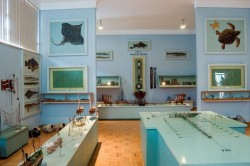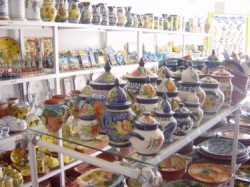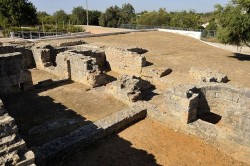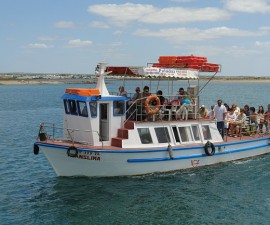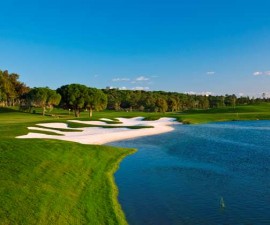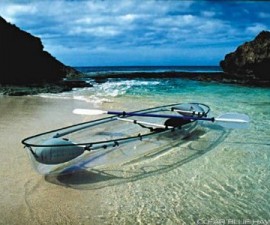For a small city, Faro has plenty of cultural offerings to travellers and tourists, both in the city centre and the surrounding area. The city’s rich heritage has been documented in lovingly curated collections that take the visitor on a journey from its settlement days several thousand years ago to its years as a major outpost of the Roman Empire, through Islamic rule and Christian reconquest to the present day and its role as the capital of southern Portugal’s world-famous Algarve region.
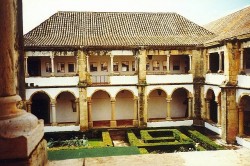
Museu Municipal de Faro
Perhaps the most famous, and the one port of call you should certainly try to squeeze into your itinerary if you are short of sightseeing during your time in the city, is the Museu Municipal de Faro, or Municipal Museum of Archaeology. Located on the Praça Afonso III, the building is a former convent, constructed in the sixteenth century and now houses a collection of art and artefacts that shed an interesting light on the city’s varied history and culture.
The convent building itself is one of the most attractive and well preserved in the country and retains a beautiful cloister. Here, too, visitors can view a thirty-foot section of mosaic floor dating back to Roman times. One of the largest ever to be found in the northern colonies of the former Roman Empire, it was discovered when building work was taking place some years ago.
There are a number of Roman statues and artefacts on display too at the Museu Municipal de Faro, many of which were found at nearby Estoi when the area was excavated some years ago, as well as a number of interesting Moorish lamps and paintings dating back to the Baroque and Renaissance periods. There is a small charge to visit the museum, which is open daily from Tuesday to Sunday all year round. Opening times vary according to the season so it is worth checking at your hotel reception before you set off.
Maritime Museum
Faro’s strong maritime tradition is documented at the Museu Maritimo or Maritime Museum. Located right on the harbour at Capitania de Port de Faro, the Maritine Museum is nestled amongst the green waterfront areas, lavish yachts, pavement cafés and contemporary bars that characterise the area.
The museum is “small but perfectly formed”, providing an educative insight into the local fishing techniques through the ages along with scale models of sail boats and naval ships, maritime memorabilia and a range of interesting items salvaged from the beach and ocean. Entry is free and a trip to the museum fits nicely with a leisurely walk taking in the sights and sounds of the surrounding area.
Museu Regional
The Museu Regional do Algarve, or Regional Museum of the Algarve, located on the Praça de Liberdade, is a celebration of the local handicrafts practiced throughout the area. The museum offers a fascinating insight into the lace-making and weaving industries of the present day and bygone ages as well as salt panning and saddlery practices.
Lots of life-size replicas and reconstructions make this a fun destination for visitors of all ages. There is a small entry fee at the Museu Regional do Algarve and the museum is open from Monday to Friday from 9am to 12.30pm and from 12pm to 5.30pm.
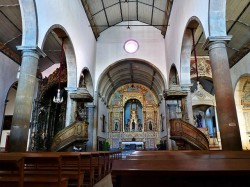
Arco Art Gallery & Galeria de Arte Trem
Art lovers are well taken care of in Faro with two notable galleries catering for varied tastes. The Arco art gallery is set right on top of the city walls offering a lovely view over the Ria Formosa as well as access to an interesting collection of contemporary Portuguese art and seasonal exhibitions featuring guest artists.
The Galeria de Arte Trem is located just off the main square in a former military barracks. It houses a slightly avant-garde collection of paintings, sculptures and installations by modern artists from Portugal and abroad.
Arts and Crafts
Portugal has a long history in ceramic arts, lacemaking, embroidery, costume and basket weaving. There are one or two boutiques dotted throughout the city’s shopping streets and in the Galeria de Faro shopping centre that are worth exploring for some fine examples of local handicrafts, both traditional and with a modern twist.
Try the local markets too for lower cost examples where you are sure to find some fine mementos to take home and remind you of your trip. The central market is open daily and specialist markets operate at various locations in the city and surrounding area on Sunday mornings.
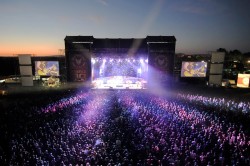
Live Music and Theatre
Faro is a popular venue for live music and theatre. The annual classical music festival is a well-known fixture in the Portuguese cultural calendar and for those with more modern tastes the annual motorbike rally, which takes place early in the summer, usually plays host to some big names in rock music. The town’s municipal theatre, the Teatro das Figuras, has an active recital and performance calendar with tickets available at reasonable prices compared to similar capital city venues.
Roman Ruins
While not strictly a Faro destination, the Roman ruins at Milreu are not to be missed if you have the time to head out of town during your stay. Situated several kilometres from the city, the ruins date back to a AD100 when a farmhouse was constructed on the site and this was later enhanced into a luxurious villa in AD300.
A well-preserved sixteenth-century house now sits on the Milreu remains but the site’s journey through the ages is a plain to see and a pleasure to behold, full of many original features such as intricate mosaics decorated with marine motifs.
Finish your cultural tour of Faro with a trip to the Estoi Palace for a sundowner on the hotel terrace. Reopened in 2009 on the centenary of its opening, as one of Portugal’s leading pousadas, the ancient Estoi Palace was formerly owned by the Viscount of Estoi, José Francisco da Silva.
The elaborate main building has been beautifully restored and is surrounded by ancient tea pavilions and beautiful Versailles-style landscaped gardens, making it the perfect location in which to relax and enjoy the beautiful rustic countryside of Portugal’s Algarve.
